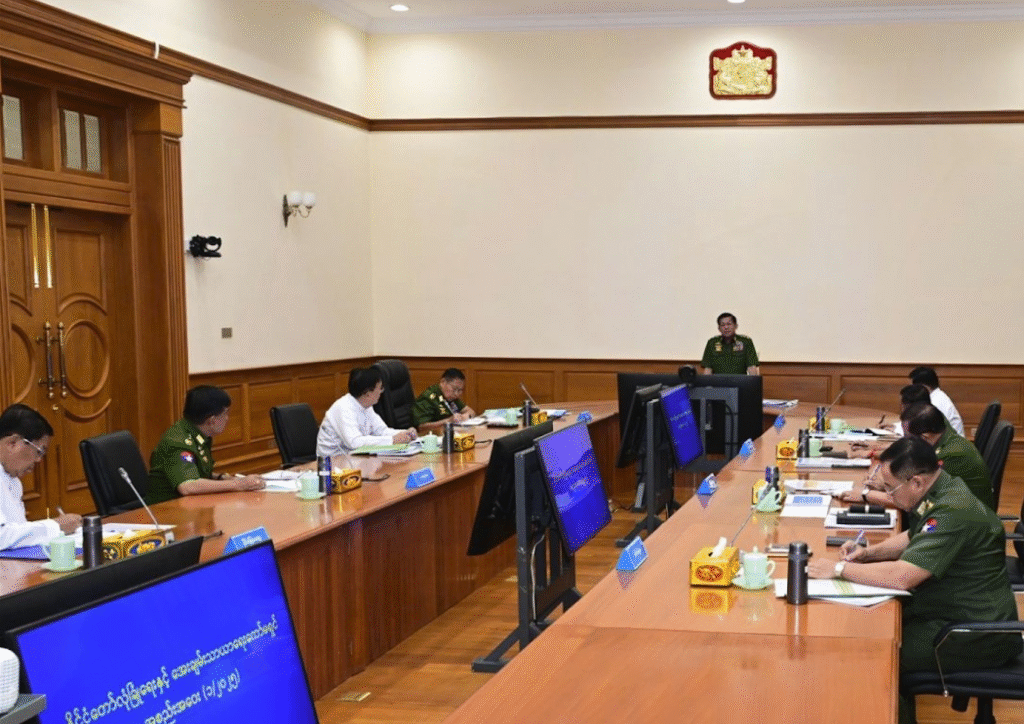Myanmar Spring Chronicle – August 18 Perspective
Moemaka, August 19, 2025
Military Announces Start Date of Staggered General Elections
The military regime has officially announced the date for the first phase of the staggered general elections, scheduled to begin on Sunday, December 28, 2025. According to the Union Election Commission, this Phase 1 will cover elections for the Pyithu Hluttaw (Lower House), Amyotha Hluttaw (Upper House), and State/Region Hluttaws.
No details were given about how many phases there will be, or the specific dates for subsequent rounds, except that the process will continue into early 2026.
The last election was held in November 2020, and the military seized power on February 1, 2021, just before the new parliament was scheduled to convene. Nearly five years later, this upcoming vote—whether dubbed the 2025 or 2025/2026 Election—marks the first national election under military rule since the coup.
In the nearly five years since the last election, Myanmar has plunged into civil war, the most intense in over seven decades. After refusing to accept the results of the 2020 election, in which the NLD won a landslide, the military detained the party’s top leadership and suppressed its ranks. The regime subsequently passed a new Political Parties Registration Law requiring re-registration. Because the NLD refused, the party was formally dissolved and is no longer recognized.
The military’s prior regimes under the SLORC and SPDC ruled for almost 22 years, during which they wrote the 2008 Constitution and allowed the 2010 general election—a tightly controlled process that lacked credible opposition and featured widespread rigging. The Union Solidarity and Development Party (USDP), made up of retired generals, won by a landslide. This was then presented to the world as a transition to democracy.
In 2012, after releasing Aung San Suu Kyi, the military allowed her to participate in by-elections. The NLD gained seats and gained international legitimacy. Then, in the 2015 general election, the NLD won decisively and formed a civilian government, even as the military retained control of 25% of parliament and key ministries such as Defense, Home Affairs, and Border Affairs.
Still, over the 5-year term, the military saw that it could no longer dominate the NLD-led government. In 2020, after another landslide loss, the military responded with a coup, ending what had been portrayed as a “transition to democracy.”
Observers note that the 2025 election, under the current leadership of Min Aung Hlaing, mirrors the 2010 election in format. However, it is widely viewed by both the public and political observers as one of the least credible and least meaningful elections in decades.
There is no expectation that it will end the civil war or broaden political space. Some registered parties participating in the election claim it might help ease the conflict slightly, or result in a marginally less repressive government than direct military rule. But resistance forces view the election as a means to legitimize military power under the facade of constitutional rule.
There is also concern that the election could weaken political unity among opposition groups by splitting alliances and diluting the strength of the revolutionary movement.
So far, no major ethnic armed organizations have expressed support for holding elections. In fact, most have declared their territories off-limits to any electoral activity. During previous attempts in 2023, enumerators collecting household data were attacked, detained, or even killed in areas under ethnic control. Meanwhile, the junta has passed laws enabling prison sentences or even capital punishment for anyone who obstructs the election.
The junta has also publicly stated that it will “provide security” for candidates—while simultaneously warning that anyone interfering with the process could face severe penalties.
This election can be compared to the 1949–1950 election, held during Myanmar’s first post-independence civil war. Like now, it was held in phases, not on a single nationwide day, and could not be conducted uniformly across the country. Though the AFPFL (Anti-Fascist People’s Freedom League) won, it failed to end the civil war, and ultimately, in 1962, the military seized power, ending democracy for decades.
Today, Myanmar faces similar conditions: the upcoming election offers no clear path to peace, and instead raises risks of further violence, political assassinations, and civilian casualties.

